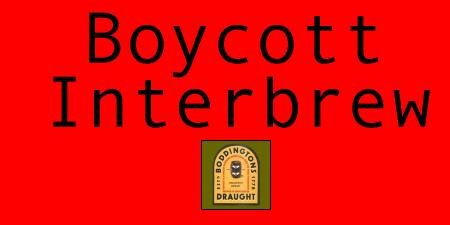The exceptionally well-named Yates on the States, the tale of a family man from Manchester, England living in Minnesota, has raised this banner. It leads to an interesting consideration of the global brewing industry.
Yates’s complaint is that cask conditioned Boddington’s ale will no longer be made as the Manchester, England factory – the Strangeways Brewery – that makes it is being shut by its Belgium based parent, Interbrew. For 200 years, Boddingtons has only been made at Strangeways. From what I read, I understand what is at risk is the cask conditioned version of the brew, the real ale with live yeast in it, as opposed to the industrial kegged or canned versions with forced C02 carbonization we see on our shelves around the world. As a general rule, real ales take time to make, do not travel well and, if they do travel, they are expensive, like the six bucks Canadian I pay for a quart of Rogue. Kegged and canned beer is built for the tractor trailer ride.
If my reading on the brewing industry has taught me anything it is that mergers and consolidations have been the stock in trade for brewers for ever. I noted this as a complaint in my review of Martyn Cornell’s excellent Beer: The Story of the Pint but now I see it as simple reality, the nature of the flux in one end, the industrial end, of the industry. Consider this. I go to check the Interbrew website and the company itself has consolidated and is now called InBev, which is about as imaginative as LiqCo or HoochInc. It brews 13% of the world’s beer. It owns the Keiths I drank as a kid but which now gives me the willies when I smell it, the Rolling Rock in portland’s fridge, and the Hoegaarden and Leffe which have both been praised here. On the one hand, if it were not for the efforts of Interbrew, I would never have tried brews like Boddingtons or Leffe. In fact, the LCBO shelves are stocked with many InBev products, making the purchaser’s job an easy one. On the other hand, I would have had a chance to try other smaller brands since killed off in the churning mill that is the merger game – but only if I travelled to where those products are made. So, when brewery mergers kill off your local favorite, either an entire brand or a real ale version of it, it is an actual but local crisis; when it adds a great new style to your shop, it is a blessing but, really, only as a start to new hunting when travelling.
The conundrum of standardization and globalization. I will leave it to you to consider Yate’s call when deciding what you reach for when you reach for a beer.ill leave it to you to consider Yate’s call when deciding what you reach for when you reach for a beer.

